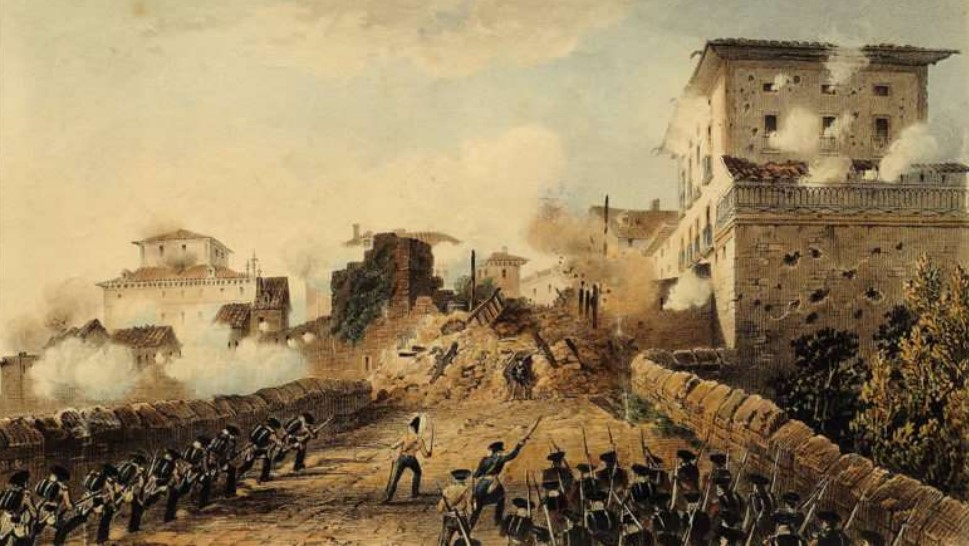
***La versión original en español del artículo se puede encontrar en este enlace. La traducción al inglés la ha realizado uno de los miembros del Círculo Camino Real de Tejas con la supervisión de los traductores del Gremio San Jerónimo***
We reproduce the fifteenth issue of the series on sovereignty from the newspaper archives of LA ESPERANZA, originally published in the issue of March 24, 1855. In it, our newspaper debates against some of the challenges received and reaffirms its conclusions.***
Although El Faro Nacional has not directly challenged any of the propositions that we have defended: when dealing with this matter, it published in its December 19 issue an article in which it upholds a doctrine contrary to that which we had defended in ours on the 13th and 16th of the same month. For this reason, we will address it here and refute it amicably, though with the brevity required by writings of this kind.
Our esteemed colleague said, «that the sovereignty of nations may be considered either as a historical fact or as a political right; that, under the first aspect, it is undoubtedly true that, when nations have exercised their power, they have varied at will the social and material conditions of their existence. This fact is so obvious and eloquent in the history of the human race that it does not deserve to be demonstrated by examples. That national sovereignty is also a right, since reason, justice, morality, and even religion itself establish the doctrine that authority must be useful and beneficial to the people. That from this maxim it logically follows that governments, in the exercise of social authority, must conform themselves to the needs and customs of nations in all that is lawful and honest. That if governments are to exist for the service and benefit of the people, and not vice versa, it is evident that the people have an incontestable right to determine the rules and conditions under which they shall be governed, so as to accomplish that end which from the beginning has prevailed over the establishment of social authority, namely, the welfare of the greatest number. That to reject these doctrines, and to give another origin to sovereignty, it would be necessary to establish the false and anti-religious principle that there are two castes of men in society: the one destined to command by the privilege of nature, and the other destined to blind and servile obedience; a theory which cannot be admitted by anyone who has studied history and the nature of man, and has delved somewhat deeply into philosophy. And that, therefore, there can be no reasonable doubt as to the right of peoples to draw up, in the manner most just and convenient to their interests, the foundations of civil power.»
We will respond to our confrere in parts. Never have the peoples exercised the sovereign power alluded to in the above excerpt. Examine the annals of all the nations that populate the surface of the globe, from the vast empire of China to the inconspicuous republic of San Marino, and surely no one will find that the general will, that is, the totality of the individuals, has intervened either in the formation of their first government or in the variations made in subsequent centuries. The governments of all have come to be what they are, through a series of vicissitudes and revolutions, in none of which the free choice of the inhabitants who in each epoch occupied their territory has had any part. Let us confine ourselves to our own country, and let us briefly review its history. In remote centuries, whose dates are lost in the mists of time, we find that this peninsula was populated by tribes, divided into camps and governed either by lords or under republican forms, all of which were patriarchal. The desire to expand their trade successively attracted the Phoenicians and the Carthaginians to the coasts of ancient Hesperia. The latter founded colonies and took possession of several regions; but soon the rivalry between Rome and Carthage made this land, always coveted by foreigners, the scene of long and bloody wars, the final result of which was to turn our homeland into a Roman province. Over time, the barbarians from the north took over and established a powerful monarchy that was almost conquered by the Arabs. The free portion gradually reconquered the land: independent nations were formed within it, and eventually, through marriages, inheritances, cessions, wars and many other circumstances, they all came to form a single nation and to be ruled by a single monarch. Does El Faro find that the governments that have existed in all these epochs have been established by the free will of the people? On the contrary, do you not see that they were all imposed on them? And when they fell, were the people the ones who tore them down? Nothing of he sort; they fell under the impetus of a more powerful foreign government, to whose rule that sovereign people remained subject, considering it to be good and legitimate. These are the historical facts, and these are the lessons that the centuries have left us.
We agree that authority must be useful and beneficial to the people; but who has told our colleague that it logically follows that the individual who exercises that authority has received it from the people? By the same token, it could also be said that parents and guardians receive their authority from their children and wards, because it must also be beneficial to them. It is one thing to say that governments have the obligation to study the needs of the people and to apply the appropriate remedy, and it is quite another to say that these same people enjoy the right to give laws to those who are to govern them, which is what the exercise of national sovereignty consists of. The end which presided over the formation of societies, is attained, as it was attained until that Misanthrope from Geneva came into the world, without having recourse to so discredited a theory. It is attained by each one fulfilling his respective duties; the head of a State by devoting himself to the welfare of his subjects, and the latter by subjecting their conduct to sound morals and to the laws, exposing their woes to the government, indicating to it the means of remedying them, and asking it, with respect, to endeavor to do so. Such is the advice of reason, morality, religion and justice, as well as the preservation of public order and the happiness of nations.
Yes, sovereignty has another origin, very different from the one assumed by El Faro. An origin that, after having explained it as clearly as one might wish in another article, we will excuse ourselves from doing so in this one. From our explanation, it does not follow that there are two castes of men, as our esteemed companion suggests: what follows is that the dynasties which, by causes foreign to this place, are now at the head of the States of Europe, and direct their public affairs. These dynasties must be obeyed by their subjects, and, if you will, enlightened by them, by virtue of the right of representation, which the laws grant them, in order that their decisions may be proper and produce good effects. To grant to the people the right to lay the foundations of civil power, is to condemn them to live without stable government, and to work out their own ruin with their own hands. Both are the opposite of the monarchist intentions expressed by the moderate newspaper that motivates this article.
(Continued…)
LA ESPERANZA




Deje el primer comentario